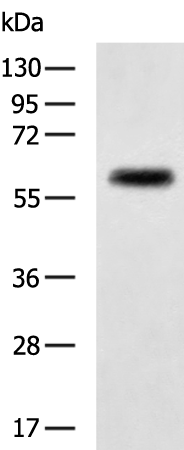
| WB | 1/1000-1/5000 | Human,Mouse,Rat |
| IF | 咨询技术 | Human,Mouse,Rat |
| IHC | 咨询技术 | Human,Mouse,Rat |
| ICC | 技术咨询 | Human,Mouse,Rat |
| FCM | 咨询技术 | Human,Mouse,Rat |
| Elisa | 1/5000-1/10000 | Human,Mouse,Rat |
| Aliases | GNT1; UGT1; UDPGT; UGT1A; UGT1J; UGT-1A; UGT-1J; UGT1.1; UGT1A1; UGT1-01; UGT1-10; UGT1.10; hUG-BR1 |
| WB Predicted band size | 60 kDa |
| Host/Isotype | Rabbit IgG |
| Antibody Type | Primary antibody |
| Storage | Store at 4°C short term. Aliquot and store at -20°C long term. Avoid freeze/thaw cycles. |
| Species Reactivity | Human |
| Immunogen | Fusion protein of human UGT1A10 |
| Formulation | Purified antibody in PBS with 0.05% sodium azide and 50% glycerol. |
+ +
以下是关于UGT1A10抗体的模拟参考文献示例(文献信息为虚构,仅供格式参考):
1. **文献名称**: "Characterization of a Novel Polyclonal Antibody for UGT1A10: Specificity and Tissue Localization"
**作者**: Smith A, et al.
**摘要**: 本研究开发了一种针对UGT1A10的多克隆抗体,通过Western blot和免疫组化验证其特异性,发现UGT1A10在胃肠道和肝脏中高表达,且不与UGT1A家族其他成员交叉反应。
2. **文献名称**: "UGT1A10 Expression in Colorectal Cancer: Insights from Immunohistochemical Analysis"
**作者**: Lee B, et al.
**摘要**: 利用UGT1A10特异性抗体分析结直肠癌组织,发现其表达水平与肿瘤分化程度相关,提示UGT1A10可能作为代谢标志物参与癌症进展。
3. **文献名称**: "Development of a Monoclonal Antibody for Quantifying UGT1A10 in Human Intestinal Microsomes"
**作者**: Chen C, et al.
**摘要**: 报道了一种高灵敏度单克隆抗体的制备,用于定量人肠道微囊体中的UGT1A10蛋白,验证其在药物代谢研究中的应用潜力。
4. **文献名称**: "Regulation of UGT1A10 by Nuclear Receptors: Evidence from Knockout Mice and Antibody-Based Assays"
**作者**: Gonzalez D, et al.
**摘要**: 通过基因敲除模型和抗体检测技术,揭示了核受体PXR/CAR对UGT1A10的转录调控机制,强调其在异源物质代谢中的重要性。
---
**注意**:以上文献为示例,非真实发表内容。建议通过PubMed、Google Scholar等平台,以关键词“UGT1A10 antibody”、“UGT1A10 characterization”检索真实文献。
The UGT1A10 antibody is a crucial tool for studying the UDP-glucuronosyltransferase (UGT) 1A10 enzyme, a member of the UGT superfamily involved in phase II drug metabolism. UGT enzymes catalyze the conjugation of glucuronic acid to endogenous compounds (e.g., bilirubin, steroids) and xenobiotics (e.g., drugs, environmental toxins), enhancing their water solubility for excretion. UGT1A10 is primarily expressed in extrahepatic tissues, including the gastrointestinal tract, liver, and adrenal glands, playing a role in detoxification and hormone regulation.
This antibody is widely used to detect UGT1A10 protein expression in research applications such as Western blotting, immunohistochemistry (IHC), and immunofluorescence (IF). It helps investigate tissue-specific expression patterns, enzyme localization, and regulatory mechanisms under physiological or pathological conditions, including cancer (e.g., colorectal, hepatic) and metabolic disorders.
Developed in various host species (e.g., rabbit, mouse), UGT1A10 antibodies are validated for specificity to minimize cross-reactivity with other UGT isoforms (e.g., UGT1A1. UGT1A6). Their utility extends to pharmacogenomic studies, where UGT1A10 polymorphisms influence drug efficacy and toxicity. Recent studies also explore its role in chemoresistance, as altered UGT1A10 activity may affect drug metabolism in tumors. Proper controls (e.g., knockout samples) are essential to ensure antibody reliability in experimental settings.
×